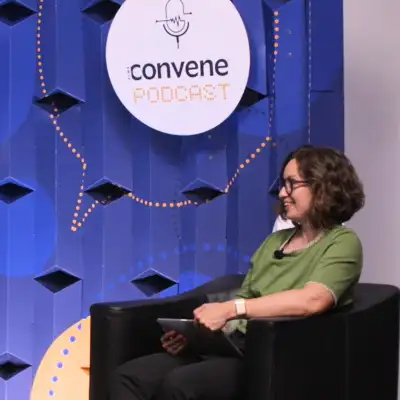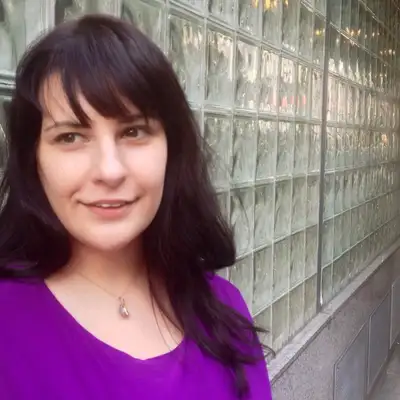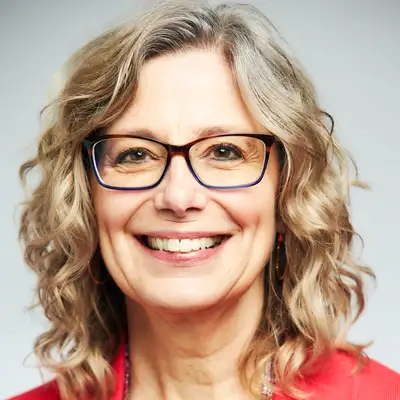Creators and Guests
What is PCMA Convene Podcast?
Since 1986, Convene has been delivering award-winning content that helps event professionals plan and execute innovative and successful events. Join the Convene editors as we dive into the latest topics of interest to — and some flying under the radar of — the business events community.
Convene Talk, ep. 75/Aug 22, 2025
*Note: the transcript is AI generated, excuse typos and inaccuracies
Magdalina Atanassova: This is the Convene Podcast.
It's time for another Convene Talk.
Today I want us to discuss a couple of sustainability reports.
The first report was produced by Honeycomb Strategies. We know them from their work with the PCMA team in the past few years and the report was named State of the Sustainable events industry summer 2025 trends and risks report,
where they identified six trends in sustainable events that shape the industry now, outlining risks and suggesting actions in each.
Briefly, the trends were first net zero carbon commitments, second circular design and zero waste events,
third generational expectations for sustainability,
four cutting edge sustainability tools,
five digital and low impact materials and six supply chain traceability and ethical sourcing.
The brief conclusion stated and I quote, the current landscape shows exciting sustainability measures being adopted as the new norm for events. While the risks are valid,
ranging from economic pressures to political pushback, event organizers can stay ahead by embedding sustainability into every stage of planning, engaging transparently with stakeholders and using data to inform continuous improvement.
End quote.
Now the second report that I wanted to bring up is the one by Convene for Climate. Convene for Climate is a global platform and movement aimed at accelerating the transition of the business events industry towards sustain sustainability and regeneration.
Powered by PCMA and in collaboration with the Strategic alliance of the National Convention Bureaus of Europe,
the report presented the outcomes of the inaugural C4C event which took place in Barcelona in October 2024,
where a curated group of 110 global industry leaders gathered to identify the most promising tactics for collective sustainability action.
What needs to be highlighted here are the tactics and priorities which the C4C partners collectively identified in a series of evaluation sessions.
As it says in the report,
these are the tactics with the highest potential to create a transformative impact across the business events industry,
its adjacent sectors and broader society. The priorities briefly are Industry Dashboard and Benchmark Tool,
Mentorship Program,
Sustainable Traveler Impact Companion System and lastly, Destinations for Impact and Voices of the Value Chain.
These tactics provide a launchpad for the C4C platform to engage the global business events community and adjacent industries to collaborate in developing sustainable solutions.
The two reports are quite different. I do see some overlap, but I believe I talked enough so before I share my thoughts I'd love to hear from you and what you think of the two reports and potentially if you see you know if the reporting is painting a similar picture for the industry or not.
Barbara Palmer: I love the exercise of looking at these two side by side and some of the things I saw that were very similar was the necessity for the Industry as a whole to get a handle on reporting and what are the KPIs.
And I feel like I was thinking about this and I know one of the things that we've written about before and is a problem is that a lot of people create dashboards and they're very wedded to using that particular dashboard.
And I feel like what I would think might be really useful is if the industry could get around common KPIs and how they're going to be expressed and then it really like, then,
you know, the dashboards could be adapted to the different niches and the different needs,
but there would be these baseline set of KPIs that people could report on.
And the other thing that I thought was,
was really interesting was how the Convene for climate talked about the need for mentorship and passing on knowledge.
And that also showed up I think in a different way in the honeycomb report where they talked about the generational expectations.
So I was thinking really a reverse mentorship is needed that you know, instead of like passing down what's already there is looking into what is gonna be wanted in the future and to learn from Gen Z what's important to them and how it could be expressed.
I think the one thing that really popped up for me is it talked about gamification and how that would be a key and it talked about how individual actions lead actions of, you know, that that is how we're going to get to sustainability is individual actions or change and sustainability.
I also think it just reminded me of those places when you go to the airport or like at convening leaders and you fill up your water bottle and it says you saved this much and here's how much we all have saved.
I, I would love to see that.
And that's really, I think little by little I carry a water bottle and I go to great lengths to avoid plastic single use plastic water bottles. And I think that I'm not alone.
I think that's very common and I think that's just one of those nudges that like you think how much difference does it make if I do this?
Not that much.
But if we all do this, how much difference does that make?
So I don't know, I just think that there's research about that too that you're likely to change if you know what your neighbor's doing.
But anyway, those are the things that popped up for me. Kate, what's on your mind?
Kate Mulcrone: Like you said, I love the idea not just of measuring what is offset, but measuring the positive impacts and in particular in the Convene for Climate report part of Ways to Measure Success are looking at social equity and economic resilience in terms of the other KPIs.
This is really revolutionary and really important.
I think that even the most well meaning sustainability programs aren't designed this way right now. They're designed to not do things, to avoid things,
rather than instead tracking the positive impact.
And then in particular on pages 17 through 19 of the C4C report,
the analyst did an amazing job with these voices of the value chain action steps. I don't think I've seen this before and I really liked how granular they got about how to improve sourcing and be more sustainable,
but also pay attention to equity.
And then the other thing that was new for me completely in the C4C report was Maggie, you mentioned this in your intro STICS,
the Sustainable Traveler Impact Companion System.
I'm just going to read this quote because I doubt I'm alone in never having heard of this before.
As environmental concerns drive increasing restrictions on travel, the business events industry must proactively defend the value of in person meetings. The STIX tool will support this by assessing and communicating the overall value of a traveler's participation in an event,
balancing their economic,
social and intellectual contributions against their carbon footprint.
This approach ensures that high value,
low impact travelers are prioritized,
helping to justify business events as an essential and sustainable component of global collaboration.
This to me is getting way ahead and I love it. I'm just so impressed by this framework and how proactive the C4C team was in preparing this.
Barbara Palmer: You know,
I've heard people talk about that,
about defending the value. But I agree with you that actually having a tool that measures it is revolutionary.
I mean, because you could think about a speaker like is a speaker nearby and weighing whether to use the speaker or that speaker.
And also like it just doesn't make sense to treat all travel the same because some things do have super high impact,
like that question about just the,
the meanings about climate change.
There's a lot of cost to travel to those and everyone always writes stories about the jets at COP or at the World Economic Forum.
But there are sometimes meetings that you should have that are high impact on the environment but also high impact on what's gained.
Michelle Russell: This is the first thing that struck me, and that was the honeycomb report is that they put the risks at the top. And I'm really, I am very interested in those risks, which is political pushback against climate policies may impact public sector support and economic concerns are affecting budgets and sustainability programs are starting to be reduced or cut.
And also we always hear about the credibility concerns of the carbon offset program. So all of those things perception wise,
makes me worry that people are going to take their foot off the gas.
And I don't mean to. That's also a really bad metaphor considering fuel consumption and gasoline.
But all of these policies,
I just don't know what the full weight of the impact will be and whether this just rallies people in our industry to say we're going to push against this and continue to keep moving forward, or there will be more of a sense of complacency because it's just not a priority for this administration.
In fact, we see ourselves sliding backwards in terms of climate change initiatives. And instead of solar energy and wind energy, we're hearing the opposite.
And so it's either this perception that people will have of like, why should I bother? Or they'll be like, I guess it isn't that important because there's nothing being done at a policy level to go all in on green energy.
Those are the things that concern me. Just because I live here in the United States. And today is another day of us dealing with the wildfires in Canada and the air quality being really poor.
And all of these things continue to happen and feels like there's a blind eye being turned to that.
Barbara Palmer: I hear what you're saying.
I do think that one of the approaches is to really show the value and not just the, oh,
you know, oh, look, you brought your own water bottle. You're not paying $3 for, for water at the airport or you save money here by this.
But just tying that then to the benefits of social equity and the benefits to destinations. If you broaden sustainability.
When you really look at the supply chain and having the supply chain close to an event,
and I feel like,
you know, that farm to table,
you have to just really experience it for it to be meaningful.
What it's like to just have,
you know, everything from. I'm just thinking about, I just went to Victoria, Canada,
and they were voted the most sustainable city in the globe on one of those measures.
And it was just such a pleasure for, like,
it was so meaningful. They would, they introduced the fishermen who caught the salmon at one dinner. It was Bob the fisherman.
And that was just, it was really, it was meaningful. It just, you know, this connection to what's going on,
like, around you.
And I think those local connections then lead to those bigger problems of like,
wildfires because of extreme temperatures are part of the problem,
and that's linked to climate change. And it's really hard to go from that macro level of how do we fix this?
But if you take it really local,
like, here's how we can fix this and we're all working together,
then I feel like then that.
And there's a reason to do that socially and monetarily.
I think that it does for me at least combat that sense of like,
ugh, this is never going to happen.
And I do think, I do take comfort too, at Gen Z's commitment to sustainability, because the policies that we're looking at with despair are not being made by Gen Z.
Magdalina Atanassova: The first thing, when you said Bob the fisherman was like,
cute,
Is he actually using the right tools to catch fish or is he,
you know, scraping the bottom of the sea and,
you know, how is he doing the fish? So there's so many questions and I feel, feel in today's day and age,
you are just not.
You want to believe,
but there's so many things that prevent you from believing such stories. And you're. You don't know if it's staged or if it's true. And it's how you picture him with a nice, you know, little whatever fisherman hook and thinks and catching just a single fish at a time.
Barbara Palmer: I did believe in Bob the fisherman.
I trusted,
I trusted the people that were. It was Destination Canada and I trust them.
Yeah, I think it's that trust. Like if Bob the fisherman had been this, like, overlay on something else that was like, well, I see this, I see that. I see.
But every action I feel like that could be.
There was such attention to detail.
There was nothing that wasn't consumable.
It was just really.
I love your question because the answer is there was trust and consistency.
Magdalina Atanassova: I, by the way, I have no doubt in this nation, Canada,
I'm just saying that the first thing in my mind was like, okay,
how much can I trust that? That's just the.
A current default that I feel all of us have at some level because of fake news of deep fakes and whatnot. So, yeah. By the way, one thing that I just want to touch upon,
Michelle, when you said you're concerned about people dropping their sustainability programs and I'm so hopeful that this is just on the surface just because of the current political climate.
And it's just like with DEI and we just wrapped the August issue with the DEI cover story and that was what the industry said.
We still do it. It's there. The work is being done.
There is not so much attention, you know, pointed at it.
And yes, the language has changed a little bit. It doesn't mean the work is not being done. And I'm hopeful that that's the case for our industry as well.
And there are sustainability programs that are in the works, they're just not slapped on poster boards. And I believe we've seen that back and forth in the industry in the last years.
We see a lot of a big peak in sustainability in programs, in discussions, in educational formats, and then it goes away. It doesn't mean that the work stops. So I hope that's the case.
Kate.
Kate Mulcrone: Yeah. Just to add to your point about communicating in different ways about the work,
I think that's what resolves this tension where,
yeah, Gen Z will come right out and say, that's greenwashing.
This is not what I want to hear about.
And that's why I think both of these reports are saying you need to communicate more proactively about things other than the carbon footprint. But then also the Honeycomb report had some specific recommendations about getting people involved.
They said dashboards, sure,
but then engage audiences through interactive programs such as sustainability challenges,
volunteer opportunities and digital storytelling campaigns.
And that's right on.
Like, that's letting people engage in a way that, that focuses on their individual choices to be more sustainable as part of the collective effort of the meeting.
So it's letting the stakeholder really be a stakeholder instead of just you tell them, we saved 2.3 cubic meters of carbon on this. And that's meaningless.
Whether or not,
as Michelle pointed out, one of the risks is so many of these carbon offset schemes have turned out to be fake and it should not be a meeting planner's job to vet these programs to try to find one that's reputable.
And so I just feel like a shift toward more organic meeting level communication about sustainability and like the positive impacts, it was going to happen anyway,
but maybe in this case the risk of greenwashing actually leads to just better opportunities for your event marketing.
Barbara Palmer: Yeah.
Magdalina Atanassova: And speaking of the reports and dashboards and all that,
I believe the one that tried to identify common KPIs for the industry was the net zero carbon events.
And then again, it was a pledge.
Yes, there were some actions, but it's a pledge. At the end of the day you can say, yeah, I support the pledge. And so what?
And that's one of the things that I deal with a lot of these programs. We see we have the motivation and we are excited about it,
but when it comes to the actual work.
It's like we like the tools, we like the time, we like the focus and things kind of, you know, go through the cracks.
Michelle Russell: I thought of that because we're working on the questions for our next survey and I liked that Tanya on our team, you had her look at our questions about sustainability.
So one of the questions we have had in the past is what sustainability practices have you adopted in the last year? Select all that apply.
And one was developed social or environmental projects, initiatives or activities to drive sustainable impact.
Developed a clear sustainability strategy and plan.
And she pointed out, these are plans, they're not actions.
So if you're just saying, I'm just going to check the box, because we're saying this is what we need to do, but then there's no follow through.
It's just,
you're just not solving the problem. So that's what I thought of when you were talking about all of these strategies. And the pledges are they're nice,
but there's no actual doing of them.
Magdalina Atanassova: Yeah. And to be honest,
if that's the price we pay with the current climate that these go away,
I don't mind that because they are fluff. They are not moving the industry forward. So I'd, I'd rather see action than pretty pictures and CEOs, you know,
holding placards and stuff and being like, yes, we signed up, I don't care, I don't care, just show me the work.
By the way, something else that I thought the two reports overlapped on was the value chain. They spoke about value chain, supply chain and circular design and I was like,
thank God they did not omit that because that's important. And I believe that's also one of the pillars. Michelle Right. For Convene for Climate,
it was very focused on circular design.
Jamie and the team spent a lot of time looking at everything so that they could ensure it's as sustainable as it could be. And a lot of the things were reused.
And that's why she also tied it to Convening EMEA. It was back to back, so a lot of the things could be reused.
And I thought that was very smart. It was just brilliant.
So I love to see those overlapping the two reports.
Anything else that you could think of we should add or should we wrap up?
Kate Mulcrone: The only thing I would mention for the C4C report is I loved how they went all in on rail travel.
It made me a little jealous. We can't necessarily do that here in the US, although I think that PCMA, at least we have an opportunity coming up with CL26 in Philadelphia,
because, like myself, I think a lot of our attendees can take the train instead of flying.
So it's just. It's really nice to see getting that granular with. How are people getting to the meeting?
You're not flying. Great.
We already have a round of applause for you as soon as you arrive.
Michelle Russell: What's great about that, and that's a great suggestion, and we should bring that to the people at PCMA, our colleagues, is that the Northeast Corridor is one that is,
I guess it's electric as opposed to. I do remember reading a story in the New York Times where someone thought that they were doing a great thing by going across country on a train to an event.
And those train rails are not electric and they're not good for the environment. But the actual carbon footprint was greater being on a train than just taking a flight. And it added days to the schedule.
But the Northeast Corridor is one that is very environmentally sound. And there's not just people from New York. It's people all on the Northeast Corridor who could come to Philadelphia.
And it's right there.
The train stops right there at the Convention center.
Barbara Palmer: I guess one of the things that I would just say about these reports and looking at them now and the benefit of being at this job for a long time is I do feel like the conversations are changing.
And so I really appreciate that.
I worked on a story this summer about RFPs,
and the thing that just really struck me is just Melissa Radu at the Ottawa Convention center said just a few years ago,
the first time she saw it in an RFP,
she. She just did a little dance.
And it's very common now, and people are learning how to use it better. But I do think that the rubber stamp pledge,
we'll say this and not do it, is, like, still there.
But there's just the part. There is this part.
There's a significant community that is moving forward and working together in ways that I think have not been there in the past. And that's really something to be glad about.
Magdalina Atanassova: Yeah. And I didn't want to touch on offsets. I'll just link it in the show notes. I had an interview with someone from Latin America who spoke very highly of offsets.
And Kate, when you mentioned that, you know, event planners shouldn't work so hard on vetting their own offset suppliers,
that's absolutely true, but I don't want to paraphrase it. I'll just link it in the show notes because that's a whole conversation. We had,
and I feel it's, it's worth listening to it as well.
So thank you all for the great discussion.
Barbara Palmer: Thanks, Maggie.
Magdalina Atanassova: Remember to subscribe to the Convene Podcast on your favorite listening platform to stay updated with our latest episodes. For further industry insights from the Convene team, head over to PCMA.org/convene. My name is Maggie. Stay inspired. Keep inspiring. And until next time.



